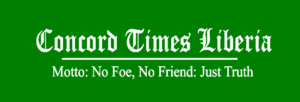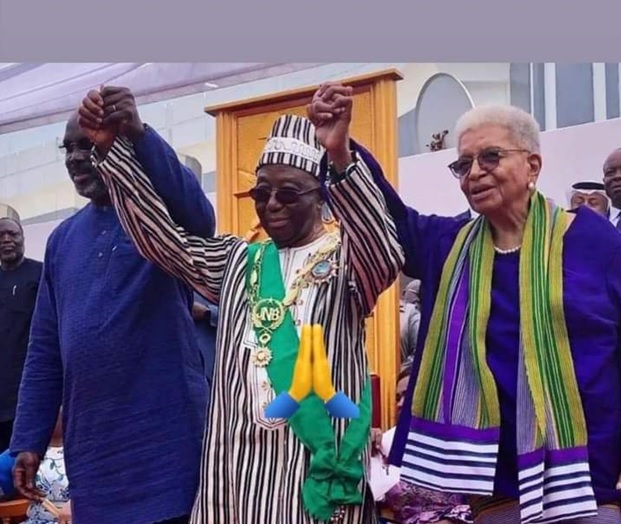By Nathan N. Mulbah
Liberia, as an independent sovereign country, has made strident strides in the building of a viable democratic culture over the period of its existence.
However, in 1980 a military coup d’état was enough to have offset the upward trajectory of the country’s democratic sojourn and eventually derailed all the democratic gains we made as a people and country and rendered the Republic of Liberia a pariah state.
Down memory lane, on the heels of the military insurgency came into being a military leadership which ruled the country from April 12, 1980, to 1985, when a national election was put in vogue to close the chapter of military rule.
Instead of the 1985 election strengthening democracy in Liberia, it became the harbinger to a debilitating civil crisis that engulfed the entire country for a period of seventeen years thus crumbling the democratic foundation of Liberia.
Following the cessation of hostilities during the first phase of the Liberian civil upheaval, a democratic election was held in 1997 using the Proportional Representation election model. Writing in his book: “Of True And False Democracy, Representatives Of All And Representatives of the Majority Only”, John Stuart Mills said: “Proportional representation (PR) refers to any type of electoral system under which subgroups of an electorate are reflected proportionately in the elected body”.
In the 1997 case of Liberia, the election ended with Charles Taylor emerging as the president and all representatives who ran on his party (National Patriotic Party of Liberia) ticket became legislators.
But again, this democratic experiment in Liberia was short-lived owing to the emergence of another round of civil war which again derailed the democratic culture of Liberia.
Taylor was forced to relinquish power to his Vice President, Moses Blah and he (Taylor) left the country to seek temporary refuge in Nigeria.
In the interregnum, a peace accord was signed in Accra, Ghana, called the Accra Comprehensive Peace Accord (CPA) which eventually set 2005 as the year for the conduct of national elections in keeping with international best practice to elect a new post war national leadership.
The 2005 Presidential and Legislative elections were indeed the beginning of the re-emergence of democracy in Liberia. The election was held after the repatriation of some Liberian refugees, the reintegration of Internally Displaced People (IDP), the delineation of electoral districts, the registration of qualified voters, the registration and qualification of the candidates, the conduct of civic voters’ education and the performance of all other due diligence appertaining to the conduct of free, fair, credible and transparent elections.
The 2005 election was conducted with Ellen Johnson Sirleaf emerging as President of Liberia. She served for six years (2005 and 2011). In 2011 President Sirleaf again contested and won the election thus giving her the chance to lead the country for additional six years running up to 2017.
In 2017, another round of peaceful election was held with Mr. George M. Weah emerging as the winner and 24th president of the Republic of Liberia.
On January 22, 2017, a peaceful and tranquil transfer of power from Madam Ellen Johnson Sirleaf’s Unity Party (UP) led government to the George M. Weah Coalition for Democratic Change (CDC) government. This transition of power is an indication of the re-emergence of Liberia’s democracy. That transition left in its trail two living past Presidents in Charles G. Taylor and Madam Ellen Johnson Sirleaf. The latter is serving jail term in a British prison for the commission of war crime in neighboring Sierra Leone, whilst Madam Ellen Johnson Sirleaf lives in Liberia and is a respectable elderly stateswoman helping to solve national and international problems.
Fast-forward along the trail of the re-emergence of Liberia’s democracy, in 2023 another round of Legislative and Presidential elections was concluded in Liberia peacefully without any sign of glitch and or post-election altercation. At the end of it all Ambassador Joseph N. Boakai emerged as the winner and effectively becoming the 25th President of the Republic Of Liberia thus making Former President George M. Weah the third former President of Liberia still alive after Mr. Taylor and Madam Sirleaf respectively.
In ensuring that Liberia’s remains on track in upholding the sanctity of the nouveau democratic credential of Liberia, it has cooperated with democratic multilateral and multinational democratic building institutions regionally, continentally and globally kowtowing and complying with the nuances and norms of international best democratic culture in concert with the approved normative framework.
For example, the African Union (AU), which has made considerable strides towards democracy promotion and peace building in Africa, adopted a Constitutive Act in 2002. The AU’s Constitutive Act brought about an interesting paradigm shift away from the doctrine of non-interference to one of non-indifference to human rights abuses within its member states.
Essentially, this shift emboldened the AU in its democracy-promotion and peace building mandate, especially in fragile and conflict-affected states in Africa. As a result, the AU has evolved a robust normative framework that has been instrumental in assisting most of its member states emerging from protracted war and violent conflict like Liberia.
Three parts of this framework are worth mentioning: (a) the 2003 African Peer Review Mechanism (APRM); (b) the 2006 African Union Post-Conflict and Reconstruction and Development (PCRD) policy framework; and (c) the 2013 African Development Bank’s (AfDB) High-Level Panel report on fragile states.
To the extent that the APRM, PCRD and the AfDB report are conceptually intertwined, they are also complementary in terms of the kind of policy initiatives they encourage for African states to strive towards consolidated democratic governance and sustainable peace, both of which are critical for people-centered socio-economic development most of which have been rolled out in Liberia over the period under review which has given this writer the clue to assert that Liberia’s democracy has been given impetus and steam to buoyancy.
Given the new political commitment and policy reforms through domestication and effective implementation of some of the norms set by the AU at the national level by Liberia, one can assert that the real value of the AU normative frameworks have spurred acceleration in the reemergence of the democratic culture in Liberia.








